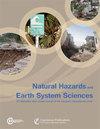Human displacements from Tropical Cyclone Idai attributable to climate change
IF 4.7
2区 地球科学
Q1 GEOSCIENCES, MULTIDISCIPLINARY
引用次数: 0
Abstract
Abstract. Extreme weather events, such as tropical cyclones, often trigger population displacement. The frequency and intensity of tropical cyclones are affected by anthropogenic climate change. However, the effect of historical climate change on displacement risk has so far not been quantified. Here, we show how displacement can be partially attributed to climate change using the example of the 2019 Tropical Cyclone Idai in Mozambique. We estimate the population exposed to high water levels following Idai's landfall using a combination of a 2D hydrodynamical storm surge model and a flood depth estimation algorithm to determine inland flood depths from remote sensing images, factual (climate change) and counterfactual (no climate change) mean sea level, and maximum wind speed conditions. Our main estimates indicate that climate change has increased displacement risk from this event by approximately 12 600–14 900 additional displaced persons, corresponding to about 2.7 % to 3.2 % of the observed displacements. The isolated effect of wind speed intensification is double that of sea level rise. These results are subject to important uncertainties related to both data and modeling assumptions, and we perform multiple sensitivity experiments to assess the range of uncertainty where possible. Besides highlighting the significant effects on humanitarian conditions already imparted by climate change, our study provides a blueprint for event-based displacement attribution.气候变化导致的热带气旋“伊代”造成的人口流离失所
摘要极端天气事件,如热带气旋,经常引发人口流离失所。热带气旋的频率和强度受到人为气候变化的影响。然而,历史气候变化对流离失所风险的影响迄今尚未被量化。在这里,我们以2019年莫桑比克热带气旋伊代为例,说明流离失所如何部分归因于气候变化。我们使用二维流体动力风暴潮模型和洪水深度估计算法的组合来估计Idai登陆后暴露在高水位的人口,以确定内陆洪水深度,根据遥感图像,事实(气候变化)和反事实(无气候变化)平均海平面和最大风速条件。我们的主要估计表明,气候变化使这一事件造成的流离失所风险增加了约12,600 - 14,900人,相当于观察到的流离失所人数的2.7%至3.2%。风速增强的孤立效应是海平面上升的两倍。这些结果受到与数据和建模假设相关的重要不确定性的影响,我们执行多个灵敏度实验来评估可能的不确定性范围。除了强调气候变化对人道主义状况的重大影响外,我们的研究还为基于事件的流离失所归因提供了蓝图。
本文章由计算机程序翻译,如有差异,请以英文原文为准。
求助全文
约1分钟内获得全文
求助全文
来源期刊
CiteScore
7.60
自引率
6.50%
发文量
192
审稿时长
3.8 months
期刊介绍:
Natural Hazards and Earth System Sciences (NHESS) is an interdisciplinary and international journal dedicated to the public discussion and open-access publication of high-quality studies and original research on natural hazards and their consequences. Embracing a holistic Earth system science approach, NHESS serves a wide and diverse community of research scientists, practitioners, and decision makers concerned with detection of natural hazards, monitoring and modelling, vulnerability and risk assessment, and the design and implementation of mitigation and adaptation strategies, including economical, societal, and educational aspects.

 求助内容:
求助内容: 应助结果提醒方式:
应助结果提醒方式:


